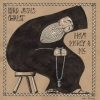The first thing we sense about an icon is its great seriousness. Compare an icon in your mind and a great Western religious painting, one that moves you to deeper faith or even to tears. You’ll notice that there is a difference in the *way* it moves you, however. A Western painting—which is undeniably going to be more accomplished in terms of realism, perspective, lighting, anatomy, and so forth—moves us in our imaginations and our emotions. We engage with it like we do a movie or a story.
An icon hits us in a different way, though. In comparison, it is very still. It is silent. We find ourselves coming to silence as we stand before it. An icon somehow takes command of the space around it. It re-sets where the baseline of our awareness is.
Many years ago my husband bought our first icon, a copy of the famous 12th century Russian icon known as the Virgin of Vladimir. We hung it on a wall in the den and grouped other, smaller pictures and paintings around it. But it never looked quite right. We kept rearranging the pictures, and then started taking some of them down. It still didn’t work somehow. In the end, we wound up taking down every other painting, so that the Virgin reigned alone in that length of space. She blew all the other pictures off the wall. Such is the quality of her presence in this image, a quality we can’t describe apart from words like “majesty,” “mystery,” and “gravity.”
It is the gravity of an icon that is the other thing I want you to notice. The people in these images are very sober. Their silence is unsettling. We don’t know how to respond and feel awkward. I think this is something like what St. Peter felt when the Lord told him to let down his nets for a catch. When he hauled up teeming nets, St. Peter said, “Depart from me, for I am a sinful man, O Lord.”
The sober presence of the Lord in an icon makes us uncomfortable because it makes us realize how far short we fall from the ineffable beauty and power of God. Sometimes people accuse Christians of trying to make people feel bad or guilty, of being judgmental in their words. When that is the case it is unfortunate. But in this case, we feel the effect of judgment from the only true judge, the only possible judge, and he does it without a word. Yet it is a judgment wrapped in a promise of healing. It is not a rejection, but an invitation. It is an opportunity to receive the healing that only God can give, because he knows us better than we know ourselves.
The steady, unsettling gaze of the Lord in an icon is like the gaze of a surgeon as he looks at a patient’s wounded, broken body. The surgeon understands our woundedness better than we do ourselves, and he knows exactly what it will take to heal it. Our Lord sees brokenness and failures in us that we can’t, that we simply won’t, that we could not bear to see. And he invites us to open ourselves to his healing, a healing that will progress very gently, very gradually, as we are able to bear it.
This isn’t to say that the healing will always be comfortable. He may ask us to give things up that we think we can’t bear to live without. He may ask us to take things on that we think we can’t begin to carry. Only he knows what it will take to heal us. No wonder an icon looks so serious. Our condition is serious. Through the merciful condescension of our Lord, we don’t have to enter into healing with a surgeon we have never seen. He has revealed his face to us, and as we gradually learn to trust him, we can reveal our own broken selves in return.
[Included in The Sacred Way by Tony Jones, Zondervan, 2004]
















